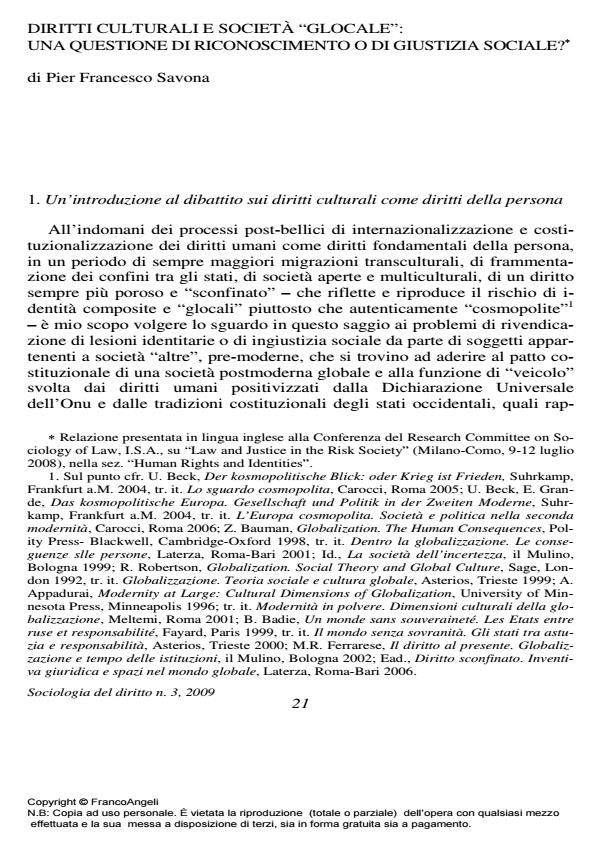The Claim of Rights in ‘Glocal’ Society: An Issue of Cultural Identities or of Social Justice and Equal Treatments?
Journal title SOCIOLOGIA DEL DIRITTO
Author/s Pier Francesco Savona
Publishing Year 2010 Issue 2009/3
Language Italian Pages 18 P. 21-38 File size 464 KB
DOI 10.3280/SD2009-003002
DOI is like a bar code for intellectual property: to have more infomation
click here
Below, you can see the article first page
If you want to buy this article in PDF format, you can do it, following the instructions to buy download credits

FrancoAngeli is member of Publishers International Linking Association, Inc (PILA), a not-for-profit association which run the CrossRef service enabling links to and from online scholarly content.
This article sets out to investigate problems arising from legal claims initiated by individuals from other societies complaining about forms of social injustice and breaches of their identity. In a contemporary context in which multicultural phenomena loom large, law tends to know no "boundaries" and we are beset by geographical and socio-political fragmentation, it is important to understand whether and how western constitutions and the principles enshrined in the UN Universal Declaration of Human Rights can establish the basic conditions for every human being to be recognised in his/her relationships in the community where he/she lives. Breaches of fundamental rights are on the increase in today’s legal order, above all with regard to their implementation. Practices of so-called "non-recognition" are producing a loss of trust in social cohesion, because they are perceived by individuals as a kind of denial of their personal capacities and moral qualities. As a result, when this feeling becomes strong, it can produce a concrete claim whose ultimate purpose is the increase and extension of judicial forms of protecting existing human rights, as well as sometimes also producing new subjective rights. While rights are symbolic forms that convey identity for creating social cohesion and while social practices produce change, practices of "non-recognition", such as violence and humiliation, are perceived differently by the groups in which they are perpetrated. This phenomenon is caused by the different perception of the symbolic role played by the rights themselves. But in a global society, there is a risk that fundamental rights may spread the image of a legal subject who is incapable of giving meaning to social cohesion. In this case, there is a need to understand whether the struggle for rights has become a skilled strategy for preserving status and institutionalising cultural models rather than a struggle for discriminated individuals to be treated equally.
Pier Francesco Savona, Diritti culturali e società "glocale": una questione di riconoscimento o di giustizia sociale in "SOCIOLOGIA DEL DIRITTO " 3/2009, pp 21-38, DOI: 10.3280/SD2009-003002